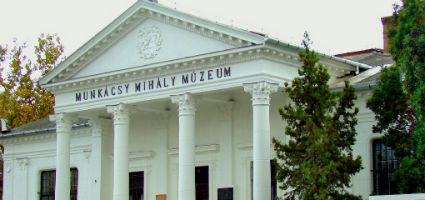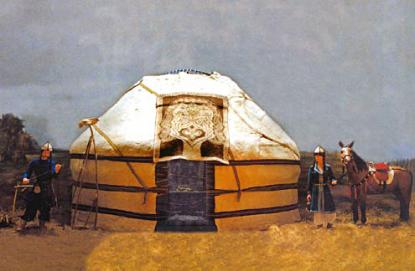2025. April 25. Friday
Mihály Munkácsy Museum - Békéscsaba
 |
Address: 5600, Békéscsaba Széchenyi u. 9.
Phone number: (66) 323-377, (66) 328-040
E-mail: mmm@bmmi.hu
Opening hours: Tue-Sun 10-18
|
Museum tickets, service costs:
|
Individual ticket for adults
(valid for the permanent exhibitions)
|
800 HUF
|
/ capita
|
|
Individual ticket for adults
(valid for the 1 temporal exhibition)
|
400 HUF
|
/ capita
|
|
Individual ticket for adults
(valid for 2 temporal exhibitions)
|
600 HUF
|
/ capita
|
|
Individual ticket for adults
(valid for the permanent exhibitions + 2 temporal exhibitions)
|
1000 HUF
|
/ capita
|
|
Individual ticket for adults
|
400 HUF
|
/ capita
|
|
Individual ticket for adults
|
200 HUF
|
/ capita
|
|
Individual ticket for adults
|
300 HUF
|
/ capita
|
|
Individual ticket for adults
|
500 HUF
|
/ capita
|
|
Group ticket for adults
(valid for the permanent exhibitions, over 10 people)
|
500 HUF
|
/ capita
|
|
Individual ticket for students
(under 26 years of age, valid for the permanent exhibitions)
|
400 HUF
|
/ capita
|
|
Individual ticket for students
(under 26 years of age, valid for the 1 temporal exhibition)
|
200 HUF
|
/ capita
|
|
Individual ticket for students
(under 26 years of age, valid for 2 temporal exhibitions)
|
300 HUF
|
/ capita
|
|
Individual ticket for students
(under 26 years of age, valid for the permanent exhibitions + 2 temporal exhibitions)
|
500 HUF
|
/ capita
|
|
Group ticket for students
(valid for the permanent exhibitions, over 10 people)
|
350 HUF
|
/ capita
|
|
Individual ticket for pensioners
(valid for the permanent exhibitions)
|
400 HUF
|
/ capita
|
|
Individual ticket for pensioners
(valid for the 1 temporal exhibition)
|
200 HUF
|
/ capita
|
|
Individual ticket for pensioners
(valid for 2 temporal exhibitions)
|
300 HUF
|
/ capita
|
|
Individual ticket for pensioners
(valid for the permanent exhibitions + 2 temporal exhibitions)
|
500 HUF
|
/ capita
|
|
Ticket for families
(valid for the 1 temporal exhibition)
|
800 HUF
|
/ family
|
|
Ticket for families
(valid for 2 temporal exhibitions)
|
1000 HUF
|
/ family
|
|
Ticket for families
(valid for the permanent exhibitions + 2 temporal exhibitions)
|
2000 HUF
|
/ family
|
|
Individual ticket for families
(valid for the permanent exhibitions)
|
1500 HUF
|
/ family
|
|
Group guide
(valid for all exhibitions, up to 25 people, on prior notice, over the ticket )
|
1000 HUF
|
/ group
|
|
Group guide
(valid for all exhibitions, over 25 people, on prior notice, over the ticket )
|
100 HUF
|
/ capita
|
|
Group guide
(valid for all exhibitions, up to 25 people, on prior notice, over the ticket )
|
5000 HUF
|
/ group
|
|
Group guide
(valid for all exhibitions, up to 25 people, on prior notice, over the ticket )
|
200 HUF
|
/ capita
|
|
Group guide for adults
(valid for 3 permanent exhibition: "Pro Natura" + "Munkácsy memorial room" + "Archeological Exhibition" or "Affluence - Ethnography Exhibition", up to 25 people, on prior notice)
|
3000 HUF
|
/ group
|
|
Group guide for adults
(valid for 3 permanent exhibition: "Pro Natura" + "Munkácsy memorial room" + "Archeological Exhibition" or "Affluence - Ethnography Exhibition", over 25 people, on prior notice)
|
150 HUF
|
/ capita
|
|
Audio guide
|
100 HUF
|
/ capita
|
The furnished jurta (the tent of the original settlers), the male and female figures dressed in folk clothes, as well as the harnessed horse was made for the 1000th anniversary of the Original Settlement. The exhibition is accompanied with maps and colored photos.

The history of Hungarians and other ethnic groups, Serbs, Romanians, Slovakians and Germans, living in symbiosis in Békés County began in 1715 when the reorganization of the county took place. In the second half of the 17th century, the county became unpopulated due to fights in the region. The lord Harruckern János György organized the settling of people to make the territory valuable again.
Slovakians from Upper Hungary, Transdanubia, peasants from the Trans Tiszanian area, Romanians and Serbs from Transylvania and the South, as well as Germans arrived from the Reins area to work in the fields again.
This is the process, the development of the County with variable ethnic population along with traditions, we show at our exhibition

The history of Hungarians and other ethnic groups, Serbs, Romanians, Slovakians and Germans, living in symbiosis in Békés County began in 1715 when the reorganization of the county took place. In the second half of the 17th century, the county became unpopulated due to fights in the region. The lord Harruckern János György organized the settling of people to make the territory valuable again.
Slovakians from Upper Hungary, Transdanubia, peasants from the Trans Tiszanian area, Romanians and Serbs from Transylvania and the South, as well as Germans arrived from the Reins area to work in the fields again.
This is the process, the development of the County with variable ethnic population along with traditions, we show at our exhibition
